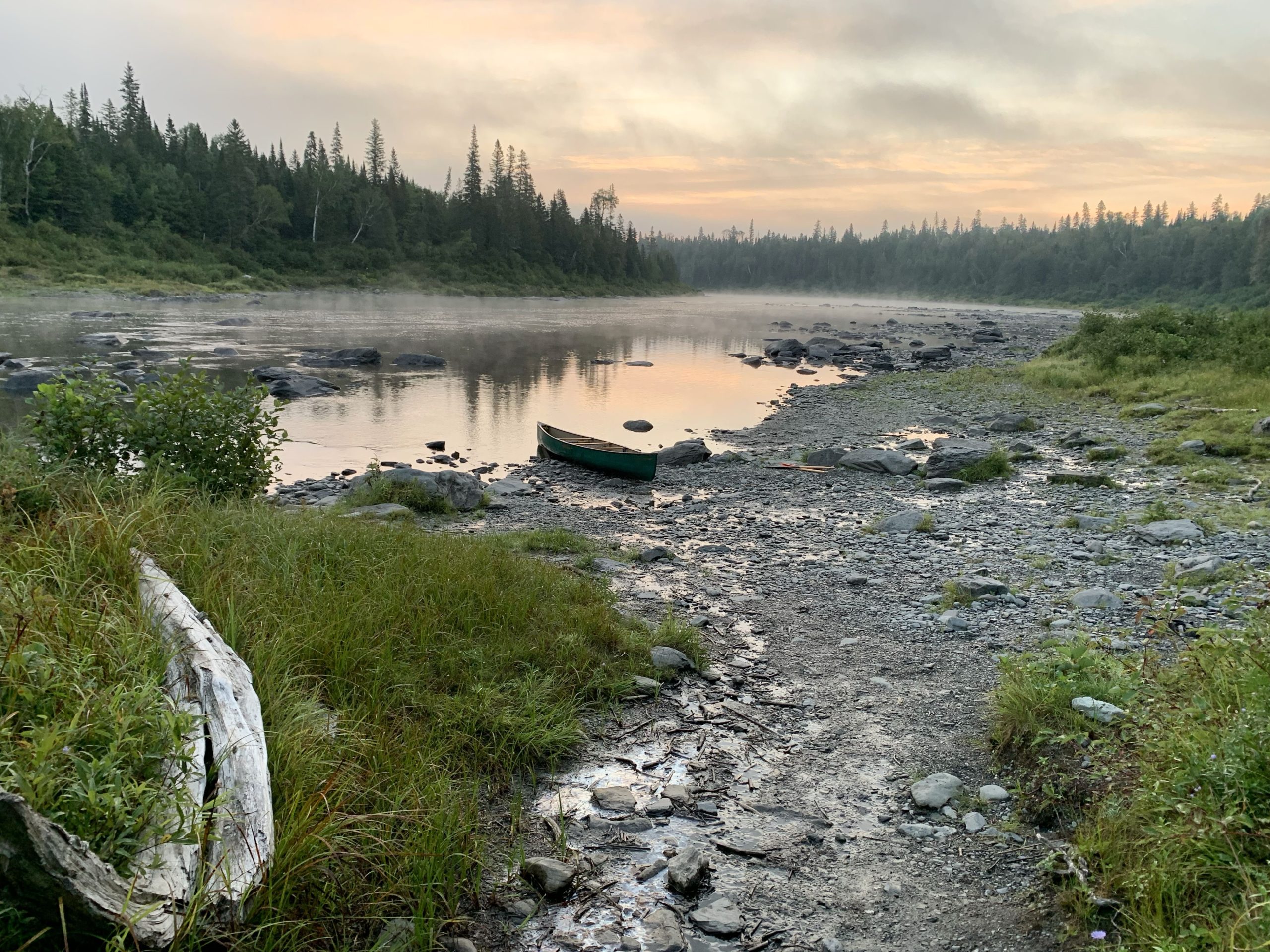There was no sound. Liz and I both remarked about the strange ringing in our ears created by the complete dearth of noise. It was exactly what we needed.
The last month had undoubtedly been the most challenging in our 5-years of marriage. We were as strong as ever, but life had been piling on for weeks. Don’t get me wrong, as a family, we are extremely fortunate. We are well employed, have a beautiful property, amazing support around us, an incredible healthy child, and the list could go on. But the sudden illness and passing of Liz’s father, our goat flock going missing for two days and the subsequent (successful) search, some tractor issues, and more, all hit when the busyness of the farm was getting a bit more than we like, the stress of our day jobs was high and prepping the farm for this very trip was peaking. We were worn out and desperate for a break.
All that noise of life, made the moment, the complete silence, remarkable. The headwater lakes of the Allagash are large, and frequent winds can make crossing them treacherous. On our first Allagash trip in 2016 (pre-Ellie), we were forced to take a zero-day due to roaring headwinds and crashing white-capped waves preventing any forward progress. Not today though. As we headed across Churchill Lake on our second day, the water had a slight ripple, but nothing more. The Allagash is isolated, stretching across the scarcely populated Northwest quarter of Maine, but it’s not without human effect. Logging operations are always hidden just out of sight of the Waterway, airline flight paths criss-cross overhead and canoes with outboard motors are permitted on certain lakes with restrictions. Still, there was no sound. No wind or waves, no trucks or planes, no motors, no people, and most surprisingly in this case, not even the quack of a duck or cry of a loon. Even Ellie sat quietly. We had made it.
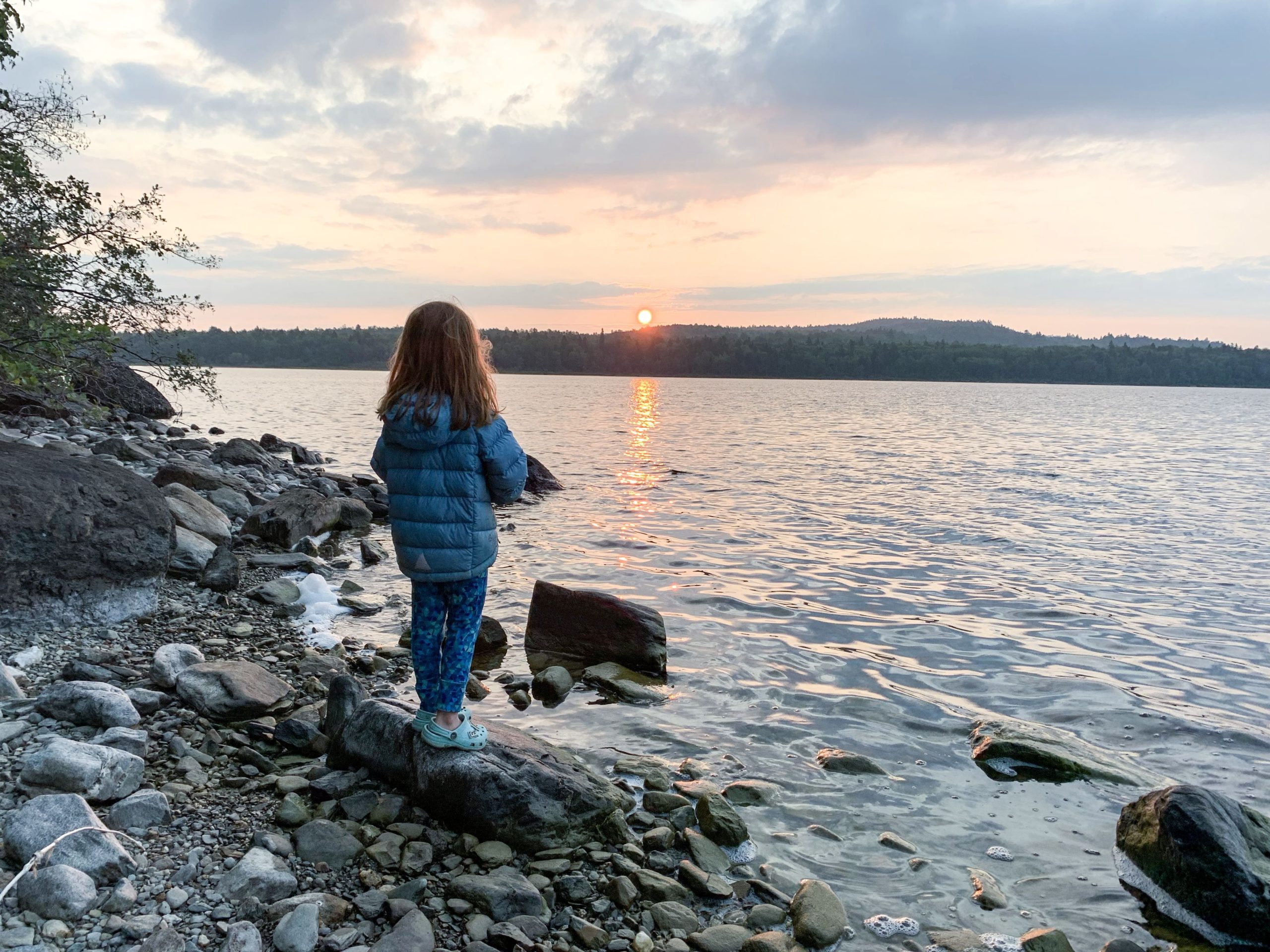
For a few weeks in August, it didn’t seem like we’d make it to the Allagash. Even the Guide Service that was supposed to shuttle our truck from put-in to take-out, an important piece of logistics for a river trip, canceled on us days before. Fortunately, but not without stress, we found a backup shuttler, and when the calendar hit the 21st, we were driving North before 7 am. We hit the Golden Road outside Millinocket and didn’t look back. After two more hours of driving, all on dusty dirt roads, we were at the put-in. Not unexpectedly a lack of rain in Northern Maine left Indian Stream, our 3/4 mile long access route from the parking area to Eagle Lake, with too little water for paddling. Just a minor inconvenience given the last month. We loaded the canoe and wadded down the stream dragging our trusty craft behind us. Finally, we made it to Eagle Lake, into the canoe, and were paddling.
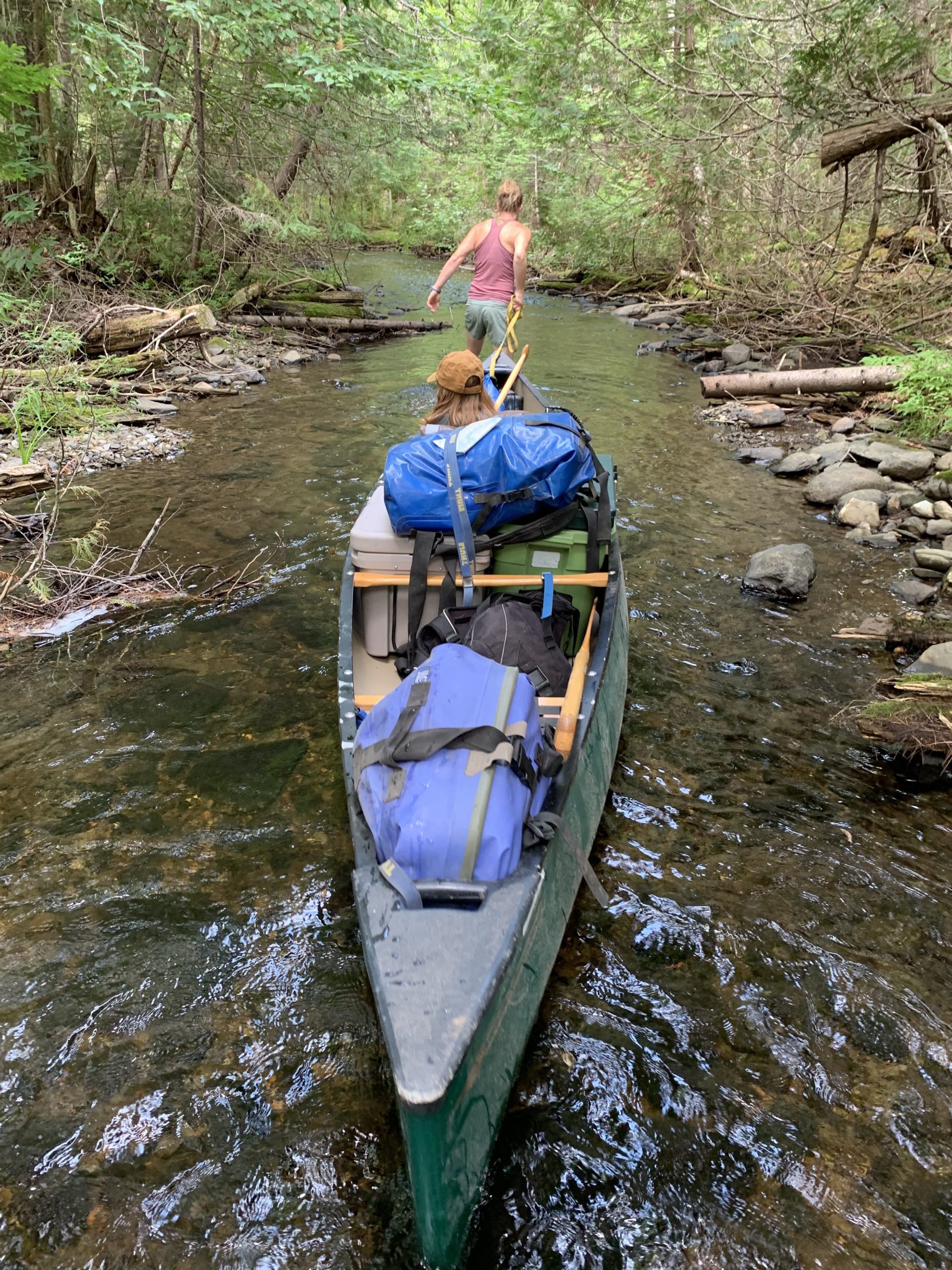
The first day and a half felt like a giant exhale. Clear weather, calm waters, and no other paddlers to compete with for campsites allowed us to truly relax. We took a minor detour on the first day to show Ellie the trains of the Eagle Lake & West Branch Railroad, a little hat-tip to Grandpa George who was a train lover. Our first campsite on the North shore of Eagle Lake gave us perfect late-day sun, a nice gravely beach for swimming, and a perfect view to watch the full moon rise over the shore to the East.
The next morning after paddling from Eagle to Churchill Lake, crossings the latter, and reaching Churchill Dam, we ran the Chase Rapids. Generously described as a 9-mile long Class II section of Whitewater, it is not particularly challenging, but it still requires some reading of the water to find and maneuver through the best lines. The teamwork required for Liz and me to steer the canoe in whitewater is a testament to, and microcosm of, our relationship. Sitting in the stern, I do the majority of the steering, and while my water reading skills have vastly improved with Liz’s instruction, they are not as good as hers.
At times Liz will yell a warning “rock on the left” and I’ll rudder hard to the right, while she throws in a strong draw in the same direction as will slip by the hazard. Sometimes I’ll disagree with her warning, and she will trust my read and with a coordinated effort we guide the canoe down a smooth line. Often I will read Liz along with the water; I’ll see her throw a slight left draw into the beginning of a stroke, I’ll glance ahead at the water, see what her stroke is showing, and mirror her effort all without a word being said. Errors happen, either I read the water wrong and we bump our way down the river awkwardly, or I’ll follow bad advice from the bow with similar results. It happens.
The best mistake on this trip was when I told Liz we needed to go hard to the left, and she gave me a strong draw to help get us there. I immediately realized that I had meant to tell her to go right, and our efforts canceled each other as we plowed straight ahead. After we dislodged ourselves from the rock, Liz turned with her hands in the air “I didn’t know what you were thinking but just did what you said!” Whoops. I owned that mistake.
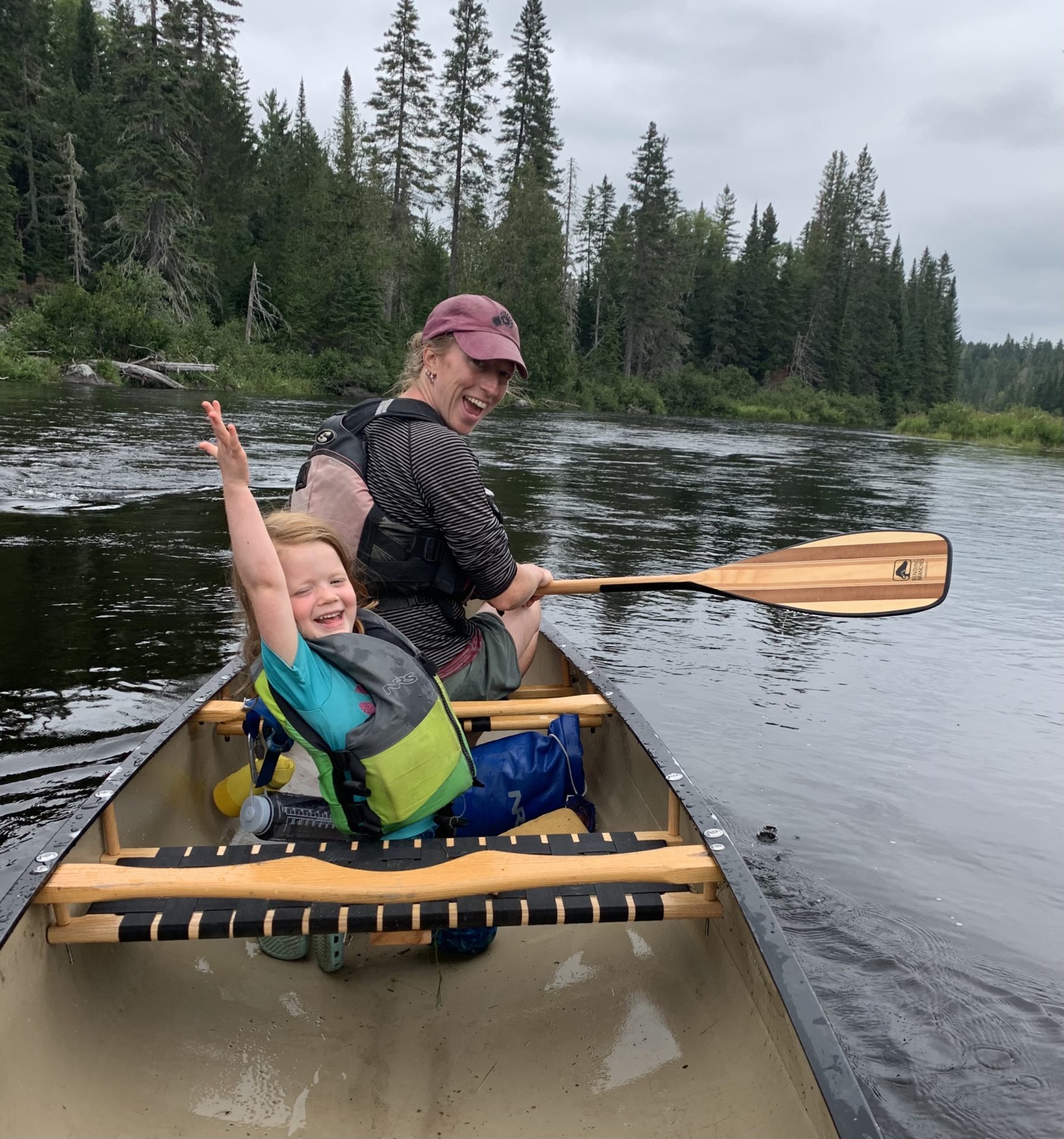
Ellie witnesses all this banter from her middle seat, a perspective from which I am sure our antics can sound a wee bit like a fight. She has learned to go with the flow, the whitewater, the yelling, the bumps, and waves. Her job is to yell “Woo Hoo,” anytime we ride smoothly over a good wave and through a rapid, a job equally important to ours. The three of us are an ok team. As we pulled into the eddy the marks the end of the Chase Rapids another canoe was just pushing away from shore; a father and teenage son presumably. The pair was soaking wet from head to toe. “You must know what you’re doing,” they said to us. “We flipped three times.”
While everyone loves white water, our favorite section of paddling is always the calmer waters that bring us into Round Pond later in the trip. Shortly after you cross under Henderson Bridge the river divides into several calm and shallow channels. Tall grass and shrubs line the banks which are dotted with majestic old-growth elm trees, a rarity in our time. Elms used to be a common tree in hardwood forests and a popular landscaping tree in cities and suburbs. However, the past few decades have seen almost all North American and European elms killed by the Dutch elm disease. While these Round Pond elms are scarred along their bases from violent ice flows, their isolation along the Allagash has sparred them from the pervasive Elm disease.
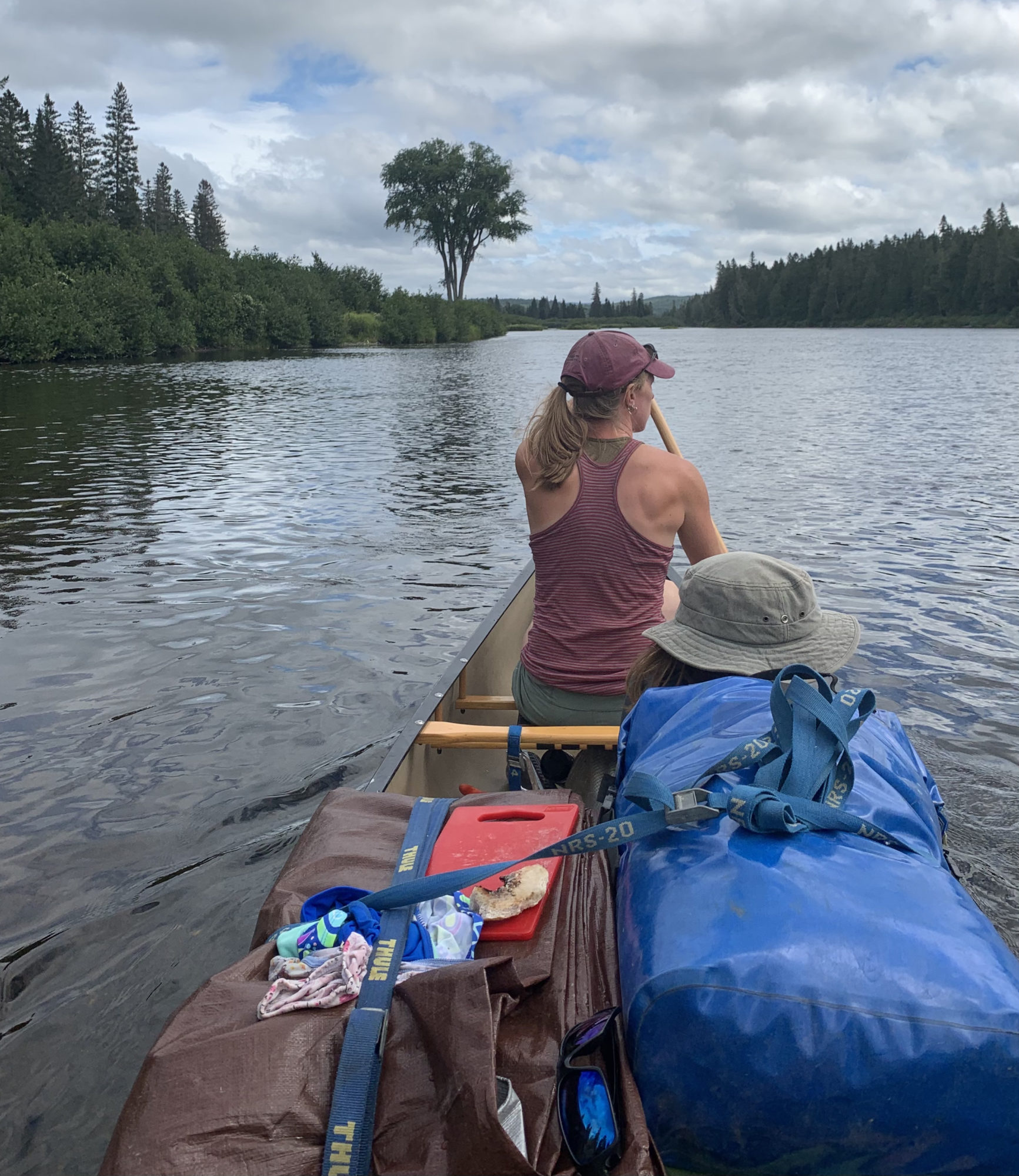
As we entered Round Pond on the third day of our trip. we found the Inlet campsite unoccupied, something that had not occurred on our three prior Allagash trips. We set up camp within sight of where the grassy, shallow, elm-lined channels enter the pond. As Ellie was waking up from her tent nap (first of the trip) I peered across the pond to the inlet channels through our monocular, a hand-me-down from Grandpa George. As I scanned the tall grasses I passed over a tree stump, only to find when I scanned back it was gone. When I found the stump again it was splashing along the shore with 8 moving legs—a Momma and baby moose. We quickly mobilized, tossing warm clothes on Ellie, buckling life jackets on the three of us, and sliding our canoe back into the water.
We could no longer see the pair of moose, but as we paddled quickly towards the inlet channel where they had been, we crossed the mouth of another inlet and saw a different one feeding in the shallows. We steered to our right and nosed our way upstream along the grassy shoreline and watched as the large female lifted her head out of the water chewing on fresh greens from below the surface. Even from a substantial distance, it was obvious she was well aware of our presence. Her ears were perked as she stared directly at us. We continued to keep our distance but after a short time, she decided she didn’t like to be watched while she ate and splashed her way to shore, out of site and into the bushes for privacy. We headed back into the pond and searched the next inlet for the Mom and Baby and we circled a grassy island we caught a fleeting glimpse as they slipped out of the water and into the woods.
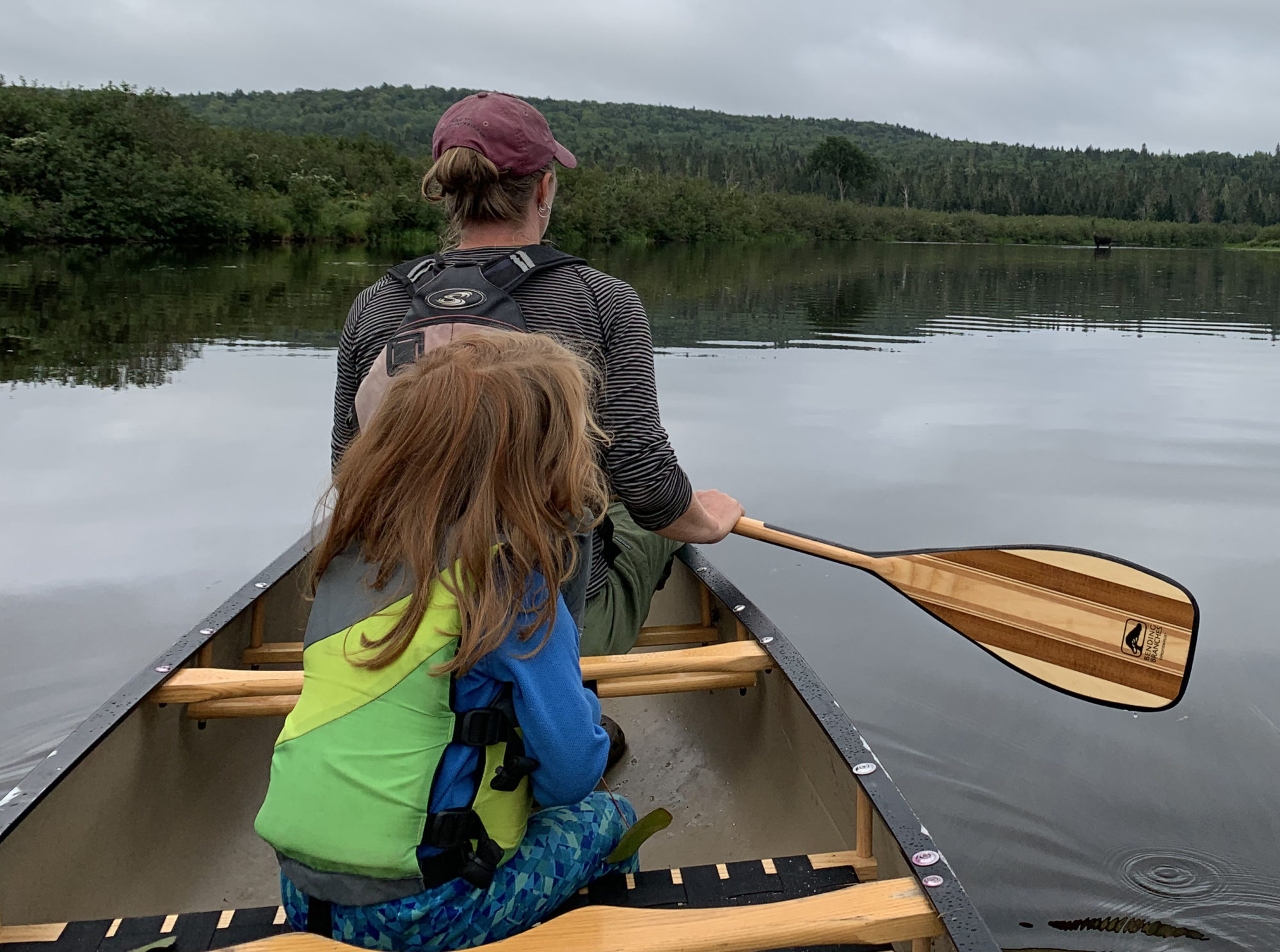
Growing up in Maine and living in the White Mountains I’ve seen plenty of moose, but seeing them from a canoe on the Allagash was different. This was not a Pinkham Notch safari moose, or a Friday evening Kancamangus Highway chamber of commerce special. The shyness of these beasts proved it. The next morning we even got an encore. Liz, first from the tent, quickly returned to tells us “They’re back.”
As we paddled out of Round Pond later that morning, one of the two other groups we saw on our trip was enjoying breakfast at the outlet campsite. A young girl, smaller than Ellie, strolled down to the shore with her Mom trailing a short distance behind. “Hi Ellie,” the girl yelled with a wave. We had leapfrogged this group a few times, passing them in Long Lake a day earlier as they set up their camp in the afternoon. The young girls, Ellie and Audrey, had yelled introductions then and were continuing their pleasantries now. We learned that Audrey is three, a year younger than Ellie, and this was her second Allagash trip to Ellie’s third. I’d love to track this family down back in the real world. Perhaps Ellie could send Audrey a letter, as they seem to have a few things in common.
It’s fun to reflect on Ellie’s growth as a child relative to our previous canoe trips on the Allagash, Penobscot, and elsewhere. Our trips started before she was even a year old. I’d engineer a seat for her in the bow, facing Liz. There were various sun umbrellas and rain canopies along the way, some better than others. Now, we are worrying how much longer she will be content to sit in the middle seat as a passenger and not in the bow or stern where she can play a more important role. While she has begun to “help” in camp with tent setup, water filtering, and gear carrying, having a 4-year old on a river trip still adds greatly to the logistics. Her presence heightens our nerves in whitewater, and her attention span for long days in the boat needs to be a consideration. It is so incredibly worth it though; watching her excitement seeing the moose at Round Pond, her joy as she splashed in the shallows of multiple remote lake campsites, or her wonder as she creeps towards a cotton tail rabbit grazing in the grass near our tent. Her ability to join intelligent conversations, and ask smart questions about the natural world around us makes it all even more fun, even if she still needs to learn when Mom and Dad would like some quiet time in the canoe.
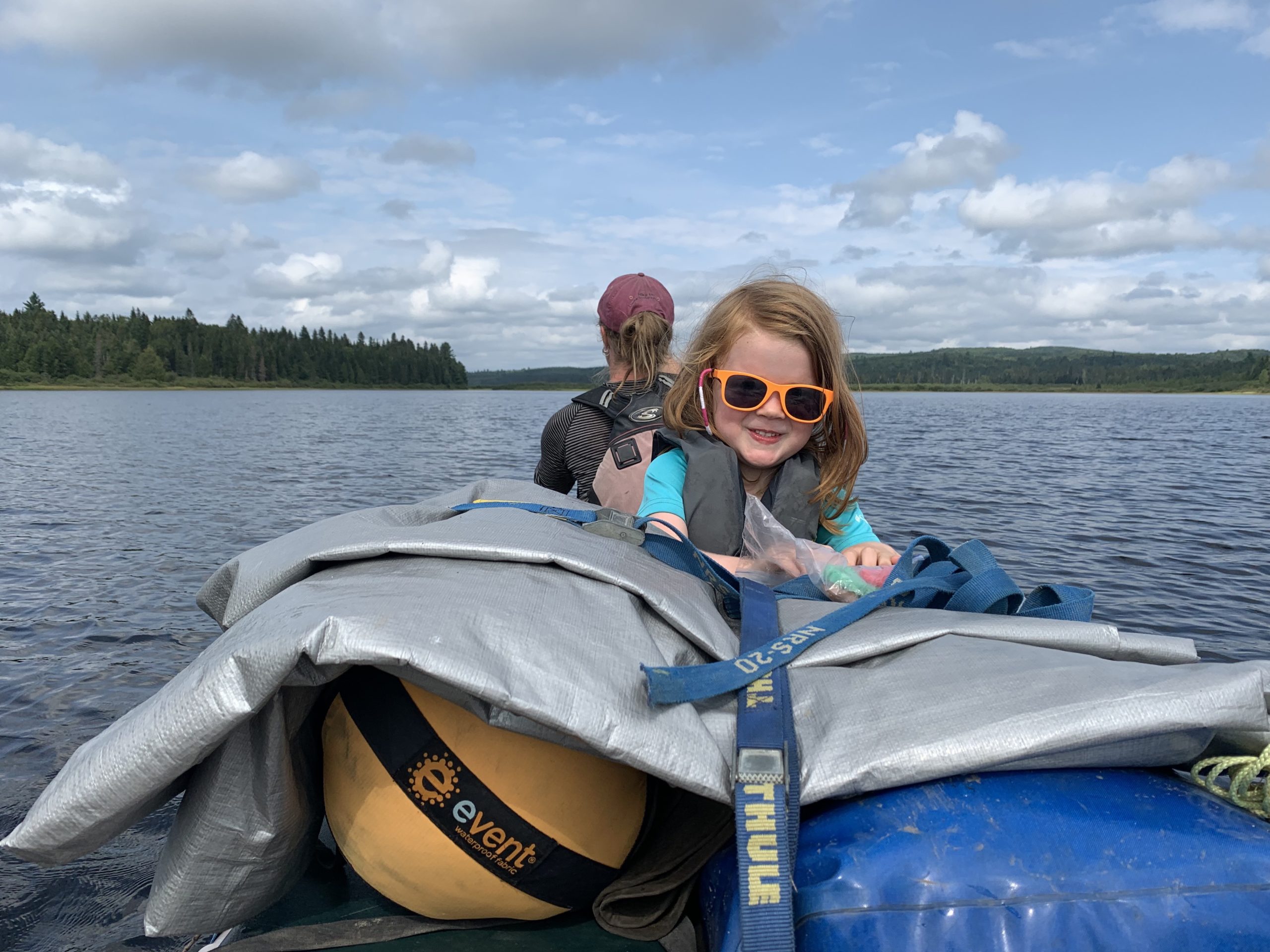
We set up camp on the last night of our trip at Allagash Falls, a violent 40-foot drop where the river cascades over upturned Seboomook slate. On previous trips, we’ve carried around these falls on the quarter-mile portage trail as a part of our last day on the river, but on this trip, we decided to camp at the falls and enjoy them a bit more. That evening we made camp along the portage trail, went for a swim below the falls, and explored on the ledges at its base.
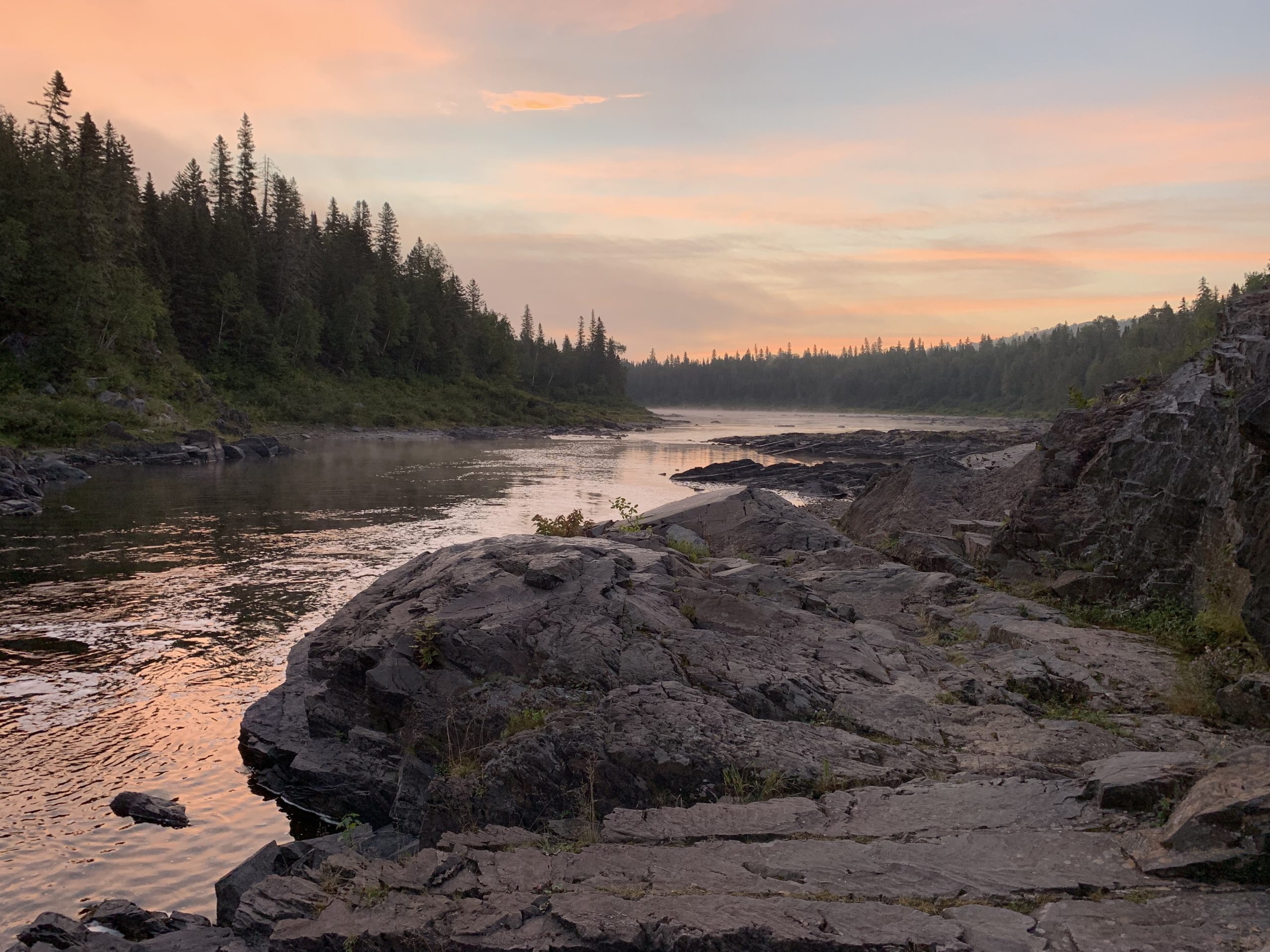
For dinner, I cooked my go-to meal, pasta with prosciutto, artichoke hearts, dried tomatoes, and garlic. We sat on the riverbank facing upstream at sunset, celebrating and lamenting the near end of our trip. This portage and the falls is one of the busiest places along the 100-mile waterway as people load and unload boats for the portage and take in the sites of the falls. We had the landmark area all to ourselves though, and fell asleep listening to the roar of the falls.
Now, a few days removed from the Allagash it’s even more obvious that the trip was exactly what we needed. When we paddle together, Liz and I hit a rhythm that is hard to find elsewhere. Whether it’s crossing a lake with white-capped waves, paddling through rapids, or down a long section of calm river dead water, our minds wander away from our paddles which we instinctively move without thought, to other places usually locked away by real-world distractions at home. I always return from our trips motivated to slow down and take more time for important things.
Last night, with the canoe still on the racks of the truck, Ellie and I headed to Mountain Pond just a short drive from home in the White Mountain National Forest. I carried the canoe on my back down the 3/4 mile access trail, while Ellie led the way wearing her life jacket and carrying her fishing pole. We slipped the empty canoe into the calm waters and I paddled us around the pond while we both fished without a bite. As the sun got low, not wanting to be late for dinner, I coaxed Ellie to the back of the boat. As she stood with her back to me I squeezed my legs together and held her steady between my knees. I had her put one hand on the tee grip of the paddle, with mine over it, and the other a short ways down the shaft where I again, put mine over hers. Now, in the proper position, we paddled for home together.
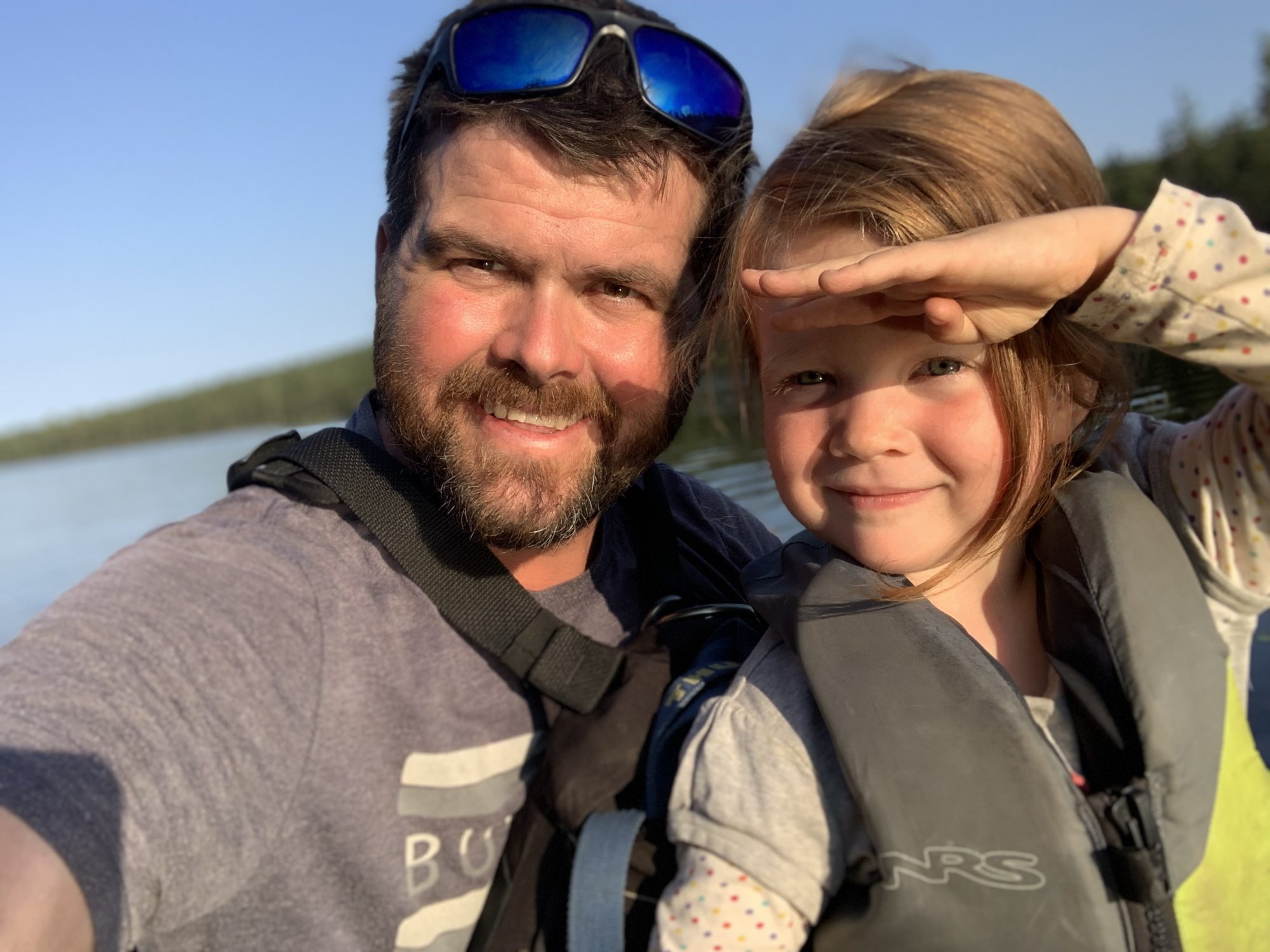
I can’t write about this trip without acknowledging the assistance we had at home. A huge Thank You to Liz’s Mom Deb for watching over the farm as a whole, and to Brian Patry, Matt and Mouna Goyette, Dominique Dodge and Eric Koeppel, and Dan Kurnick for being expert goat milkers, animal feeders, and jacks of all trades to keep the farm going while we were gone. We would not be able to leave our home behind without the support of these special people.
